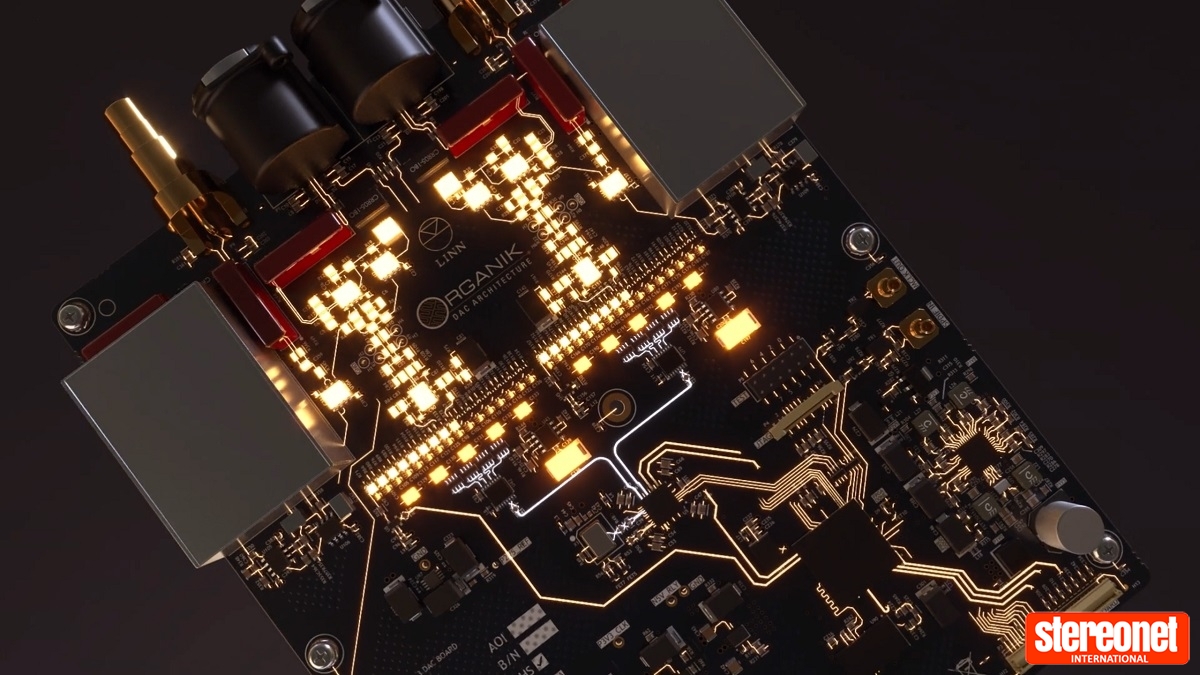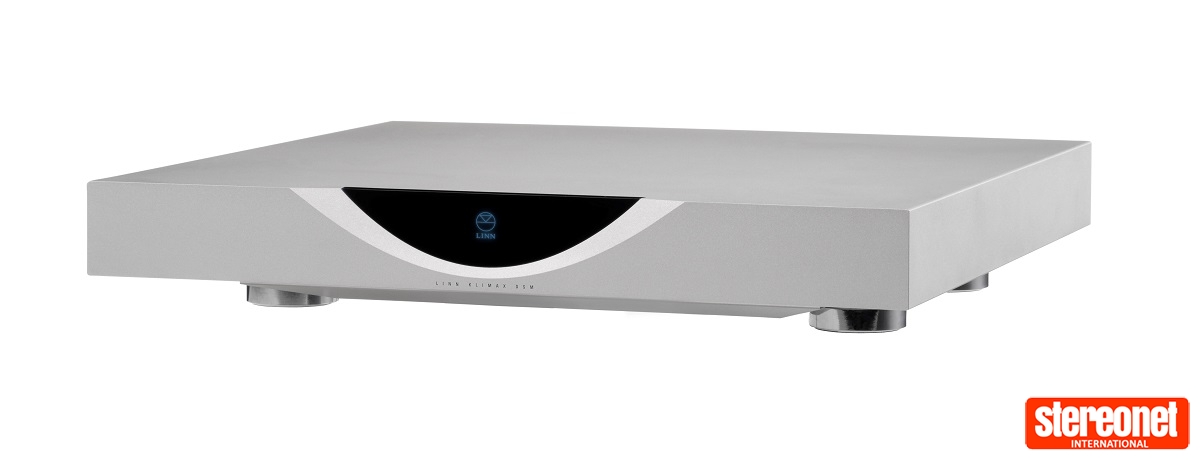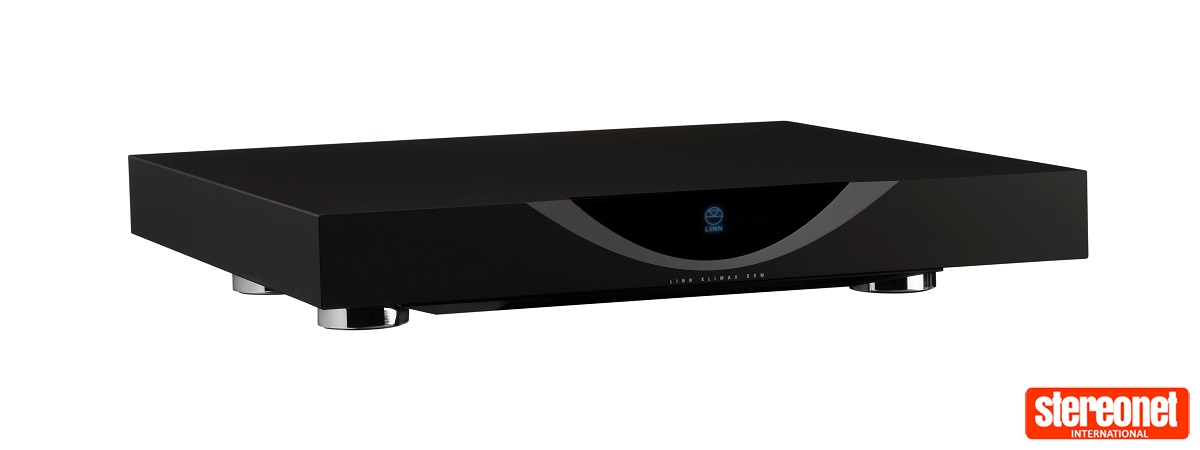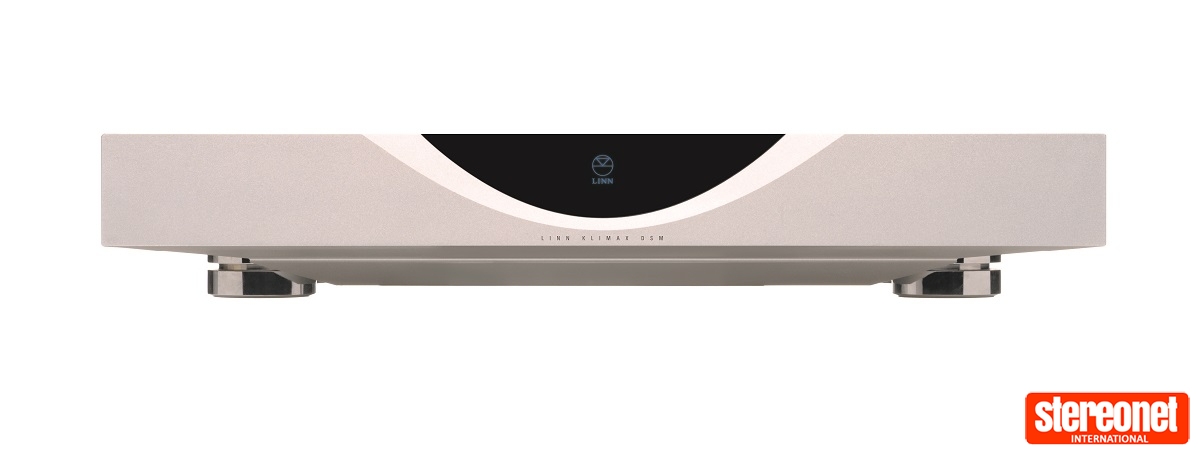Linn Klimax DSM Organik Upgrade Review

David Price samples Linn's ultimate DAC upgrade to its original high-end streamer…
Linn
Klimax DSM Organik DAC Upgrade
USD $7,020 MSRP

I still remember reading the press release announcing that Linn Products was ceasing the manufacture of its CD players. It wasn't a few years or so ago, as you might expect, but as far back as 2009 – when the format certainly did not seem under threat. Even more surprising was that Linn made extremely good silver disc spinners – in the great classic Compact Disc playing stakes, the Sondek CD12 still ranks close to my number one. So why would the company throw away such success overnight?
Two years earlier, I had been having lunch with Linn's illustrious founder, Ivor Tiefenbrun – who was still managing director of the company at that time. He'd asked me to do the first review of a completely new Linn product – the Klimax DS network music player. Having already sampled several generations of Logitech Squeezebox – the world's first popular network music player – perhaps he thought that I fully understood what was, at that time, a very obscure concept?
Network music players – or what we generally call 'streamers' these days – make complete sense now, but they did not in 2007, not least because most audiophiles simply didn't know what they were. Almost all who did associated them with MP3 files, which were things for kids who were too cheapskate to buy CDs. Also, they mostly sounded horrid thanks to their low bitrates – many were 96kbps when CD was 1,411kbps! So it was brave of Linn to make its first-ever streamer and stick to its guns amidst a sea of doubters.

Last year, the company discontinued the original Klimax DS – which last sold new for the princely sum of $26,650 USD. The product had been given many updates over the years but retained the gorgeous 'hewn from solid' aluminium casework and simple front-mounted alphanumeric display. I think the product's styling looked just as good in 2021 as it did in 2007, which is no small feat; it was only the small display that let it down in its later years. The new, so-called 'Next Generation' Klimax DSM addresses this point with a huge front-mounted fine-pitch affair, but some think it's lost the minimalist beauty of its predecessor.
The real downside of most 'legacy' streamers is the ancient DAC and/or audio board – but not the Klimax DSM. True to its Linn roots, the company offered several versions over the years, with ever-better digital converters. The first upgrade to the 2007 DS/0 version was the 2011 Klimax DSM/1 with an audio board upgrade, and then came the 2015 Klimax DSM/2 Exakt, and finally, the 2016 Klimax DSM/2 Katalyst. Now though, you can retrofit Linn's newest and best ever 'Organik' DAC board to any of the earlier versions for the princely sum of $7,020. This should give it the audio performance of the company's latest Klimax DSM 3, currently on sale for a cool $39,000 - the internals of which can be seen below.

So to be clear, the Klimax DSM/2 Organik you see here is no longer on sale new – it's an upgrade package for all the earlier variants of the Klimax. From my point of view, this will still be of interest to many streaming fans for the following two reasons. First, there are plenty of old Klimax DSMs on sale secondhand, with prices starting around the same as the new Organik DAC board. That's a lot of metal for your money and a lovely thing to have in your home – as well as a fine streamer in its own right.
Second, the Organik – as we shall soon see – offers superlative sound quality. It's head and shoulders over the previous Katalyst model, and if you're not worried about the 'Next Gen' Klimax DSM/3's fancy display, a 'preloved' Klimax DSM/2 gives you a cheap way to the finest sounding Linn streamer. Joe Rodger, the company's brand manager, told me: "We're not closing the door; we're giving existing owners the opportunity to upgrade with the biggest asset of the Next Generation version…"
IN DEPTH
The Organik is more than just the latest Linn DAC card, though. It's an entirely new, bespoke, Linn-designed and built, FPGA-based DAC and digital filter package rather than tweaked third party, bought off-the-shelf silicon. Almost all streaming DACs use Burr-Brown, Wolfson, ESS, Texas Instruments or Asahi Kasei DAC chips, but Linn's new DAC goes the extra mile, using the company's own hardware and software – something which has taken decades to design. Rodger adds: "Katalyst was the very best we could do following thirty years of designing our own clocks and oscillators, but we were ultimately beholden to the confines of a third-party DAC chip. We had reached the limit of possibilities through utilising such chips in our products."

Organik includes both a DAC and analogue-to-digital converter stage, working at up to DSD256 or 24-bit/384kHz resolution – in truth, this is all you'll ever need. It has been "thirty years in the making", but the production work started in 2019 and finalised in March 2021. Linn says: "This is a paradigm shift away from the component-matching DACs, and moves the requirement to being extremely accurate clocking – it's in the time domain…"
Linn's Joe Rodger says that the performance advantage of Organik comes from its unique combination of PWM (Pulse Width Modulation, Delta-Sigma) modulator and AFIR (discrete Analog Finite Impulse Response) conversion stage. When put together, they are "immune to many of the problems that affect other discrete designs — where small errors in switching times or resistor values can generate distortion." To get them to give their full benefits, the company's engineers have expended much effort on optimising the physical layout of the circuit board and getting the power supply and clocking as good as possible.

An eight-layer circuit board is used, which Linn says delivers ultra-stable power and clocking to the DAC. Power for the conversion stage is generated by a discrete regulator and delivered using multiple internal power planes. Clock traces are said to be "matched to within fractions of a millimetre, to ensure that every part of the DAC receives its clock at precisely the same time". More information is available on Linn's website.
This new homegrown DAC is now being rolled out as a retrofit upgrade and is said to be a straight board swap that "takes as little as fifteen minutes for qualified service personnel to perform". Furthermore, it's available for all Klimax DS and Klimax DSM variants – even the first generation from 2007. Also, the Klimax 350 integrated loudspeakers and Klimax Exaktbox are eligible for the upgrade; you'll need a pair of Organik cards for the speakers, of course. By the way, Organik is not MQA compatible – and there's a blog post on Linn's website explaining why.
THE LISTENING
The new Organik DAC is a significant advance on the already excellent Katalyst. It lifts an electronic veil from the recording, bringing a more vibrant, intricate and natural sound that you can almost reach out and touch. As a result, music becomes more immersive, engaging and propulsive. Rather than sounding like great hi-fi, the new DAC's myriad improvements happen at a deeper, musical level – where the innate emotion of the players is revealed in all its glory.

To me, this is the essence of superlative digital. I've been an almost lifelong digital sceptic; I still listen to vinyl as my primary source as I rarely hear anything electronic that can match my well-fettled turntable, tonearm and cartridge. Yet that doesn't mean I can't spot great digital when I hear it – and the Organik DAC card is precisely this. It has a naturalness that's lovely to listen to, confirming my theory that the better that both digital and analogue get, the more they sound like one another. The trick is to be able to play a recording – whatever the format – and see if you find yourself immersed in the musical action rather than listening to the actual recording itself. Put simply, are you drinking the wine or looking at the bottle?
It would be unkind to say that the Linn Klimax DSM Katalyst is the former, and the Organik version is the latter; that's a bit too reductive. Yet there's certainly the feeling that via the latter, your window onto the recording has been widened and the glass cleaned. You realise that the Katalyst wasn't quite as good as you thought it was. Having been short-sighted since I was thirteen years old, I have this sort of revelation every few years. I reluctantly go to the optician, thinking I don't need new spectacles – and come out, blinking in the daylight with my new glasses on, and everything is suddenly back in focus…
For me, the test of any piece of hi-fi is to play a perfectly average – or even bad recording on it. Forget about Dire Straits' Love Over Gold or the latest Norah Jones album; I'm talking about some gritty, low rent rock recording, ancient jazz or poorly produced pop. ABBA's Take a Chance on Me is a good example of the latter; it's a top song if you like that sort of thing, but nothing the superstar Swedes ever did could be classed as audiophile. It is overkill playing this on a KDSM Katalyst – let alone Organik – as when you think about it, most people heard it back in 1978 on a crappy budget stereo music centre or AM radio. The Katalyst tells you that it's not as bad as you thought, and it duly proves lovely to listen to.

Okay, so there's surprisingly little bass for a pop record – it was likely mixed not to be too hard for a cheap record player and cartridge (Pioneer PL-12D/Shure M75/6, etc.) to track. Yet what there is, is satisfyingly supple and shows the artistry of the playing on this recording. Vocals sound processed (as indeed they are), and the stereo mix is odd (again, that's correct), yet still, the Linn gets into the groove and immerses you in a wash of warm sound with a curtailed, fluffy treble. All just as it should be then, but the Organik ratchets up the emotional level – the song is more poignant, moving and touching.
I got the same sensation from Microdisney's A Few Kisses, a grimy indie-rock recording from five years after the ABBA track came out. It's a great song and very powerful too, but not exactly Hotel California in the hi-fi dem disc stakes. The KDSM Katalyst was really impressive to listen to, revealing detail in this recording that I'd not heard before; there was a sense of solidity and purpose – and the thumping drum machine had real guts. Yet the Organik version took things up a level; I found myself revelling in the (sadly recently deceased) singer's voice. Cathal Coughlan was crooning with all his heart rather than doing a workmanlike vocal take. As a result, the emotional intensity was more remarkable, but also, hi-fi aspects like the texture of his voice were better defined.
All of which makes the Organik DAC something of a leveller. Seemingly poor recordings don't seem so bad, as you make a more direct connection to the music. Great ones are even better, though, like 4hero's Spirits in Transit. Released in 1998, this was a state of the art analogue recording for its day and is still superb now. The latest Linn Klimax tells you precisely this, setting an expansive soundstage inside which is a lovely, fruity Fender Rhodes keyboard, electric piano and soaring violins with a delightful timbre. All this is put to some brilliant acoustic drumming, playing drum'n'bass style patterns that you'd generally find drum machines and sequencers doing. The Organik pieced everything together beautifully, giving a genuinely affecting sound – those strings hitting me hard emotionally.

The wonderful thing about this DAC, then, is that it's so music-agnostic. It just opens up the recorded acoustic of whatever's being played and lets whatever is there flourish. The rock classic that is The Doobie Brothers' It Keeps You Running shows that there's nothing in the way of embellishment; it's tonally very neutral but with a stronger bass than you get from any other streaming DAC preamp I've ever heard. Up top, treble is smooth and crisp, very detailed and natural rather than sweet and sugary. The Organik's midband is an exercise in studied neutrality; tonally, it's the hi-fi equivalent of Switzerland!
Rhythmically and dynamically, it's impossible to criticise. I didn't have either of its Chord or dCS rivals to hand for comparison, but I know them very well. I'd say this is absolutely at the top table in terms of letting the musicians express themselves and indeed enjoy themselves. The music just sounds so emotionally engaging that it's hard to think about anything else while you're listening, as the listener ends up transfixed.
THE VERDICT
 The new Organik DAC card is a superlative upgrade for any Linn owner currently using a Katalyst, breathing new life into the product. The now sadly discontinued Klimax DSM is a lovely streamer in so many ways, and with an Organik makes it a wee bit harder to justify the latest version in terms of value for money – or indeed any of its rivals for that matter. An essential audition if you're in the market for such a thing.
The new Organik DAC card is a superlative upgrade for any Linn owner currently using a Katalyst, breathing new life into the product. The now sadly discontinued Klimax DSM is a lovely streamer in so many ways, and with an Organik makes it a wee bit harder to justify the latest version in terms of value for money – or indeed any of its rivals for that matter. An essential audition if you're in the market for such a thing.
Visit Linn for more information
David Price
David started his career in 1993 writing for Hi-Fi World and went on to edit the magazine for nearly a decade. He was then made Editor of Hi-Fi Choice and continued to freelance for it and Hi-Fi News until becoming StereoNET’s Editor-in-Chief.
Posted in: Applause Awards | 2022 | DACs | Sources | Streamers | Hi-Fi | StereoLUX!
JOIN IN THE DISCUSSION
Want to share your opinion or get advice from other enthusiasts? Then head into the Message
Forums where thousands of other enthusiasts are communicating on a daily basis.
CLICK HERE FOR FREE MEMBERSHIP
Trending
applause awards
Each time StereoNET reviews a product, it is considered for an Applause Award. Winning one marks it out as a design of great quality and distinction – a special product in its class, on the grounds of either performance, value for money, or usually both.
Applause Awards are personally issued by StereoNET’s global Editor-in-Chief, David Price – who has over three decades of experience reviewing hi-fi products at the highest level – after consulting with our senior editorial team. They are not automatically given with all reviews, nor can manufacturers purchase them.
The StereoNET editorial team includes some of the world’s most experienced and respected hi-fi journalists with a vast wealth of knowledge. Some have edited popular English language hi-fi magazines, and others have been senior contributors to famous audio journals stretching back to the late 1970s. And we also employ professional IT and home theatre specialists who work at the cutting edge of today’s technology.
We believe that no other online hi-fi and home cinema resource offers such expert knowledge, so when StereoNET gives an Applause Award, it is a trustworthy hallmark of quality. Receiving such an award is the prerequisite to becoming eligible for our annual Product of the Year awards, awarded only to the finest designs in their respective categories. Buyers of hi-fi, home cinema, and headphones can be sure that a StereoNET Applause Award winner is worthy of your most serious attention.





